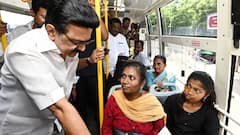Tamil Nadu Rolls Out Rs 1,000 Women's Monthly Entitlement Scheme
With the launch of the scheme, women family heads will receive Rs 1,000 directly to their bank accounts and they can withdraw the cash with ATM cards issued to them.

In a first-of-its-kind initiative, Tamil Nadu government rolled out Kalaignar Magalir Urimai Thittam or Kalaignar Women Entitlement Scheme, a monthly finance assistance scheme, for eligible women family heads on the occasion of DMK founder Annadurai's birth anniversary on Friday (September 15). With the launch of the scheme, women family heads will receive Rs 1,000 directly to their bank accounts and they can withdraw the cash with ATM cards issued to them. The women's entitlement scheme is a promise made by DMK in their manifesto during the run-up to Tamil Nadu Assembly Elections 2021.
The state government allocated Rs 7,000 crore in the budget 2023-24 for the implementation of the scheme. With the allocation, the women's entitlement scheme became the highest-spending social welfare scheme for the Tamil Nadu government.
#WATCH | Tamil Nadu CM MK Stalin inaugurates Kalaignar Mahalir Urimai Thittam (Kalaignar Women's Rights Grant Scheme) at Kanchipuram. Under this scheme, Rs 1000 per month will be deposited to the accounts of all eligible women beneficiaries
— ANI (@ANI) September 15, 2023
CM also distributes ATM cards to the… pic.twitter.com/MG7vE5t80W
The DMK-led government shortlisted around 1.06 crore women as eligible for the scheme. Earlier, the government said that over 1.60 crore women applied for the scheme but the eligible women were shortlisted based on certain criteria.
The eligibility criteria include the woman should be above 21 years of age i.e., born before 2002 and her family income should be below Rs 2.5 lakh per annum.
The family of the woman must not own above 5 acres of wetland or 10 acres of dry land and the annual electricity consumption of the woman's household must be less than 3600 units.
Although the programme attempts to be inclusive, some groups of people are not allowed to apply. Those include the women who work for banks, income taxpayers, professional taxpayers, pensioners, elected members of municipal authorities, and public sector undertakings (PSUs), as well as workers of state and federal governments and PSUs.
The district collectors have also been instructed to ensure the smooth registration and distribution process in their respective regions. A few women received the amount on Thursday itself.





































